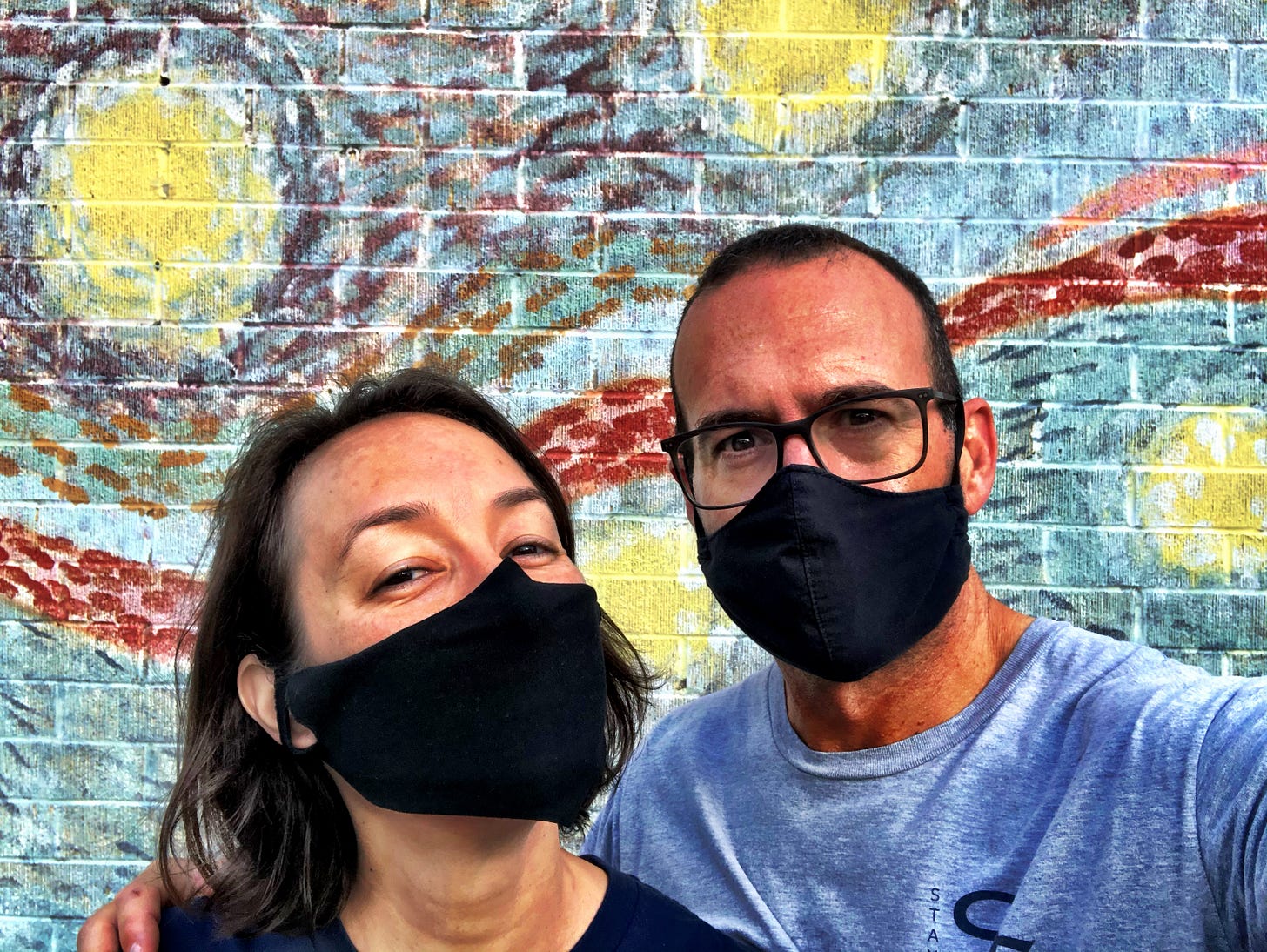Virtual Reality
What we see with our own eyes is what we know is not true
This week, Rachel Megan Barker writes about performative identity when we have no one to perform to, and as always I offer some tips on things to do, read, watch, and listen to.

But first, did I tell you about the time I went to a party with the Bush administration? They were all there, the ones I know: McKinnon and Dowd, James from work, John Barry and Karen, Karl and his brilliant wife, also named Karen. Don’t get me wrong — they all knew I didn’t belong there, but these are Bush people. Even a casual party in a ranch-style home was an occasion for good manners. I was welcome.
“She’s coming,” one of them said. Suddenly, they all got scared. They repeated it to each other as a warning. “She’s coming,” they said. No one needed to ask who she was. The news of her approach terrified them. They first made sure their friends knew, and then each left the house, got in their cars, and drove away.
No one offered me a ride, and I didn’t have a car. I stood on the street and watched them leave. I was running out of time, so I found an open car door, slid into the front passenger seat, and pulled a comforter over me. My feet stuck out at the bottom. She’d be able to see my feet. I could hear her approach from behind on my side of the car along the curb. She opened the car door, and when I felt her slide over me I got so scared I woke up.
A lot of us are having hyped-up anxiety nightmares these days, which is less a reflection on our inability to process external stimuli than of the scale of the stimuli and our lack of distraction from it. Three months ago, wearing a mask and gloves in a grocery store would have marked you as a Hughesian germaphobe. Now, walking into Costco without a mask as if nothing is wrong sends the warning signal, because something is wrong.
Anxiety is a logical response to a pandemic that has killed about as many Americans as died in the wars in Vietnam, Korea, Afghanistan, and Iraq combined. Increases in gun sales to calls into suicide hotlines have experts worried about a coming suicide epidemic. After 9/11, about one in ten New Yorkers had PTSD. I don’t know whether we can get post-traumatic stress if we can’t get past the trauma. Until we get a vaccine, anxiety will be the emotional white noise of the Great Interruption.
I feel it, too. The anxiety feels like a painful massage from inside my body that brings no relief, only hurt. I have to make myself stronger to beat it back. Learning about infection rates in various settings helps, somewhat. Seeing online videos of people flouting social distancing does not. A strict morning routine of meditation, yoga, and exercise helps, as does trying new recipes, working on the book, talking to you… All that helps. Thinking about whether voting is worth a mortal risk does not. Letting my mind wander into traffic does not. The anxiety comes out of nowhere, and I find myself on the ground, looking up at an incongruously blue sky, imagining the terror of sitting in the sealed cabin of an airplane, everyone wearing masks, hoping no one is infected. I’m not there, I tell myself. I am here. The pain in my arms and legs from the stress means I am here.
I walk outside and often am the only one wearing a mask. I walk past sunbathers in the park where doughy, shirtless young men throw around a football. People everywhere are jogging and riding bikes. What we see with our own eyes is what we know not to be true.
Everything looks disconcertingly normal until I get takeout from the coffee shop or the bagel place, and I’m back in reality. You call ahead and give your credit card number. You put your mask on and go inside to grab your order and leave with as little touching as possible. Our new paradigm is a liquor store robbery. In and out, no one gets hurt.
Florida’s governor fired their data person when she wouldn’t juke the stats. Texas’ governor said we could justify reopening commerce if the pandemic numbers fell by a certain standard. The pandemic, unheedful of political realities, stuck stubbornly to biology, so the governor changed his biological standard to meet the political one. Georgia’s governor opened restaurants, theaters, nail salons, and gyms to the public in late April and needed to show that it had been a good decision because everyone could see that it had been a bad one. He released a chart showing a steady decline in C-19 deaths, infections, and hospitalizations after he issued his order, but the days were ordered on the chart to create the decline, not to reveal one. To rearrange reality, the governor rearranged the days: “April 30 was followed by May 4; May 5 was followed by May 2, which was followed by May 7 — which in turn was followed by April 26.”
To create this virtual reality, we make adjustments like a janky CGI, tweaking the algorithm to make things appear normal. In Korea, a soccer team put (fully clothed) sex dolls in the stands to create the illusion of spectators. Restaurants, unable to operate at full capacity, are putting life-sized pictures of people around tables to make the actual human customers feel less like they are alone in a restaurant. But these illusions only amplify the anxious white noise. Reality is not what we see with our own eyes, no matter what we’re told.
I woke up this morning and forced myself to notice the feeling of the sheets against my legs. My focus flailed in meditation like a dog on the Fourth of July, circling on my worries. I lost count of my sun salutations. I did my old man workout (push ups, sit ups, squats) and then pushed and pulled a kettlebell until my shirt was heavy against my chest. My sciatic nerve in my left leg flared. I stood in the shower while the pain burned. The pain is real. The pain means I am here.
The Loss of Performative Identity
by Rachel Megan Barker

Rachel Megan Barker does too many things to know how to easily write a bio, but her life features a lot of politics and some community organizing, education policy, music and theatre whilst bouncing back and forth between two continents. Today she offers insights into what happens when you have a performative identity and no one to perform to.
RIP
I would like to pay respect to those we lose along the way. If there is someone you would like to be remembered in future newsletters, please post links to their obituaries in the comments section or email me. Thank you.
How we’re getting through this
Reading peoples’ secrets
Learning the Costco price tag codes
Doing free online PopSugar workouts
Doing Pamela Pupkin’s Quarantine Workout
What I’m reading
The Atlantic: “Just How Much Is Sports Fandom Like Religion?”
Ryan Holiday: “Can You Be Still?”
Elise Hu: “What I Learned From Writing Letters To Strangers Across America”
MIT Technology Review: “Our weird behavior during the pandemic is messing with AI models”
MIT Technology Review: “Nearly half of Twitter accounts pushing to reopen America may be bots”
NYT: “A Case for Cooperation Between Machines and Humans”
John Rowley: “The Last Dance- 10 Insights About Teamwork”
Washington Post: “For many fans, the absence of sports feels like a loss. Psychologists say that’s normal.”
Got some reading suggestions? Post them in the comments section, and I might include them in the next newsletter. Have a book to promote? Let me know in the comments or email me.
What I’m watching
BoingBoing has advice on how to find a book without knowing the actual title
Only took me a dozen years to get around to, but thanks to L.S. I finally got around to seeing Elizabeth. Iconic as heck.
The most interesting thing about Michelle Wolf’s Netflix special, Joke Show, is that the wife and I laughed at different jokes. And if you watch it, definitely follow that up by listening to her explain the otter joke on the Good One podcast, which, if you aren’t listening to, please don’t tell me. I’d rather think well of you.
Got suggestions? Post them in the comments section, and I might include them in the next newsletter.
What I’m listening to
Liza Anne has earned my devotion forever because of this lyric: “You were like sand in my ice cream.” But check out the video, clearly produced when no one is taking vacations. The limitations of social isolation add a fissure of loneliness to the video for “Bad Vacation,” a good song about the disappointment of a bad relationship.
Got suggestions? Post them in the comments section, and I might include them in the next newsletter.
What do you think of today's email? I'd love to hear your thoughts, questions and feedback. I might even put ‘em in the newsletter if I don’t steal it outright.
Enjoying this newsletter? Forward to a friend! They can sign up here. Unless of course you were forwarded this email, in which case you should…
Want a way to send gifts and support local restaurants? Goldbelly’s got you hooked up.
I used this to order scotch delivered right to my door. Recommend.
I’ve lost 35 pounds this year with Noom, and haven’t had to cut out any foods. Noom is an app that uses psychology, calorie counting, and measuring activity to change your behavior and the way you think about food. I’m stronger and healthier than I’ve been in years. Click on the blue box to get 20% off.
If this newsletter is of some value to you, consider donating. Honestly, I’m not doing this for the money. I’m writing this newsletter for myself, and for you. And a lot of you are contributing with letters and by suggesting articles for me to post. But some of you have asked for a way to donate money, so I’m posting my Venmo and PayPal information here. I promise to waste every cent you give me on having fun, because writing this newsletter for you is some of the most fun I’ve had. Venmo me at @Jason-Stanford-1, or use this PayPal link.

